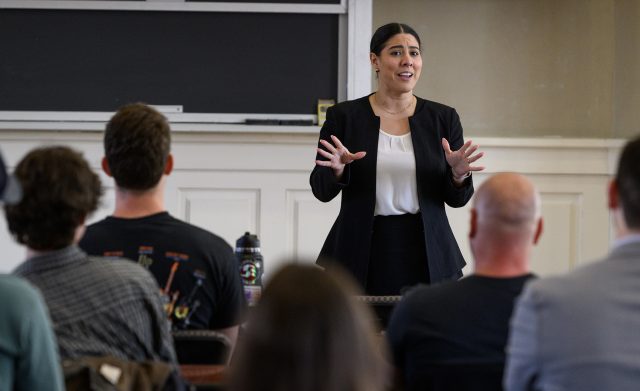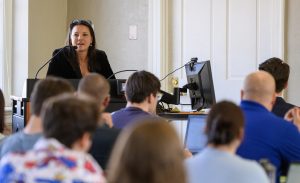
Stephanie La Rue, chief of diversity, equity and inclusion in the Office of the Director of National Intelligence, speaks to students Thursday (March 30) during the keynote event of the Center for Intelligence and Security Studies’ annual ‘Days of Intrigue’ exercise. The exercise allows students to network with members of the intelligence community and solve complex problems in an international crisis simulation. Photo by Thomas Graning/Ole Miss Digital Imaging Services
OXFORD, Miss. – Seventy University of Mississippi students navigated the complex world of intelligence, policymaking and a possible trigger of NATO’s Article 5 obligation over the weekend as part of the Center for Intelligence and Security Studies‘ annual “Days of Intrigue” exercise.
During the event, students network with intelligence community specialists who offer career advice and advise on a simulation of an unfolding international incident.
This year’s mission: Trouble in the Baltics. Refugees fleeing a war-torn country to a NATO member nation could be in danger from foreign forces. Students were charged with reining in the unfolding international crisis by answering the questions, “What do we know and how do we react?”
This high-pressure exercise gives students an opportunity to use the skills and analytic tradecraft they learn in the classroom while networking with representatives of the intelligence community, said Shaio Zerba, director of the Center for Intelligence and Security Studies.
“They get to talk to members of the IC in a one-on-one fashion and really get to understand those agencies’ perspectives on hiring and what it’s like to work on tough national security issues,” Zerba said. “With the national security experts, they’re seeing that what they’re learning in the classroom will apply in the real world.”
The three-day event kicked off Thursday (March 30) with a keynote speech from Stephanie La Rue, chief of diversity, equity, inclusion, and accessibility for the Office of the Director of National Intelligence.
“I want to talk to you about the real intelligence community,” La Rue said. “What gets you there and what keeps you there.”
La Rue detailed her journey into the world of intelligence, from getting her law degree from the University of Maryland to working for the CIA to reporting directly to the director of national intelligence. Speaking candidly, La Rue told a story of networking, doubt and, sometimes, failure, while urging students to “fail forward.”
“There is always going to be that part of your brain that tells you you’re not good enough,” she said. “Don’t listen to it. Don’t let it stop you. Put your application in.”
On Friday (March 31), participating Ole Miss students gathered in Johnson Commons banquet room to hear from experts from nine intelligence agencies: the Office of the Director of National Intelligence, Central Intelligence Agency, Department of Homeland Security, Defense Intelligence Agency, Federal Bureau of Investigation, National Geospatial-Intelligence Agency, National Security Agency, Office of Naval Intelligence and the State Department’s Bureau of Intelligence and Research.

Shaio Zerba, director of the Center for Intelligence and Security Studies, speaks to students during the center’s annual ‘Days of Intrigue’ exercise, which includes a simulated international crisis for students to monitor and provide guidance for national security leaders. Photo by Thomas Graning/Ole Miss Digital Imaging Services
The panel focused primarily on the skills or education that intelligence agencies look for in new recruits.
“What we’re looking for is broad spectrums of talent,” said James Stallings, C4 Systems and Networks division head for ONI’s Farragut Technical Analysis Center. “That drive for problem-solving, to be able to look at things and want to find the answers.
“Study what you like, what you’re invested in, and don’t narrow your opportunities, because what you’re learning can be applicable to the IC.”
Micheline Idowu, who represented the FBI in Friday’s panel, agreed that intelligence agencies aren’t looking for a particular major or background, but emphasized the importance of the intelligence and security studies minor.
“We’ve hired a lot of the folks from your program and they’re doing great things at the FBI,” Idowu said. “Take advantage of these opportunities.”
Intelligence experts also reviewed students’ resumes, performed mock interviews and taught students the ins and outs of security clearances during panels throughout the day.
Saturday’s national security simulation focused on information and disinformation from a hostile nation. Student teams represented different intelligence agencies and compiled reports based on the information they received.
A recent addition to the national security simulation, students in the center’s new global securities studies minor composed the National Security Council team, allowing students to practice making policy recommendations.
The teams also were required to send envoys between agencies to collaborate and create a better picture of the unfolding threat, while the National Security Council team wrangled with providing policy options under great uncertainty.
“If they’re paying attention to everything, they’ll see there is a lot of confusion on all parts, which is often the situation,” said Wesley Yates, associate director of the Center for Intelligence and Security Studies, who helped design the simulation.
“The analytic tradecraft they learned in the classroom – teamwork, team building and organizational skills – apply to this.”
While the simulation may have ended Saturday with no war declared, Zerba noted that one day, these skills could help students analyze data and make decisions in real-world situations.
“This is a high-stress situation,” she said. “It gives students something to talk about in an interview. When someone asks if they have experience working in teams and making decisions in a high-stress environment, they can point to this.”